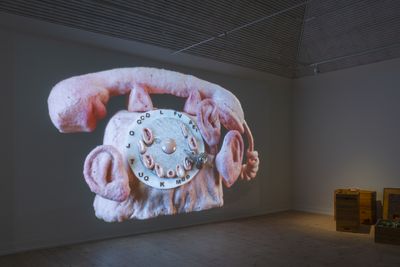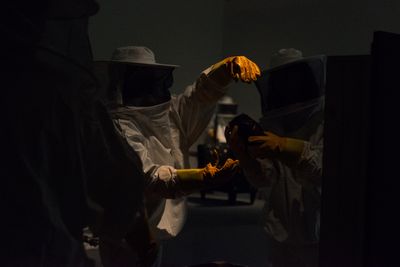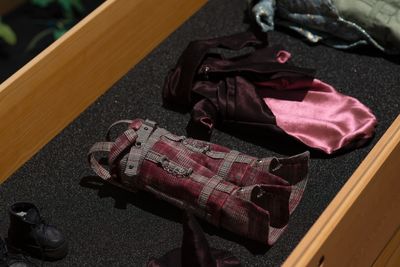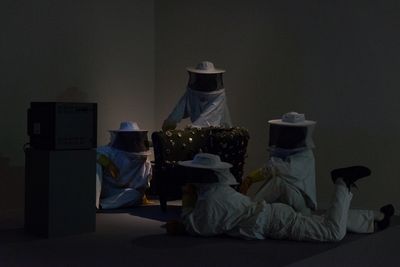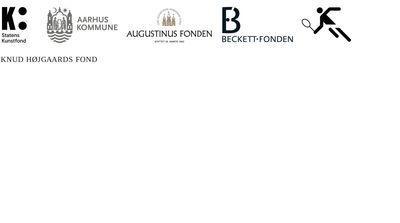Sophia Ioannou Gjerding & Mark TholanderEnsembles and Monsters
–
–
Sophia Ioannou Gjerding (b. 1989, DK) and Mark Tholander (b. 1988, DK) are presented together in the exhibition Ensembles and Monsters. Inspired by the quote "If categories are unstable, we must watch them emerge within encounters" by the American anthropologist Anna Tsing, it explores how collections and encounters often create assumptions that we take for granted.
About the exhibition
The exhibition consists of a series of new productions. In them, Mark Tholander works with performance to explore the identity-creating nature of communities, while Sophia Ioannou Gjerding uses video installation to examine how different collections create narratives.
Various experiences influence how we encounter the world. We are influenced by our interpersonal relationships, through culture, and by what we learned in school or at home. In Ensembles and Monsters, both artists explore the so-called baggage we bring with us when we engage with the world around us.
In her work, Sophia Ioannou Gjerding begins by exploring how our relationship to other beings are influenced by video games, and in particular how certain video games mirror the act of gathering or foraging, but to the extent to which it becomes hoarding. She then considers different things that we consider to be heritage: first, a spoon from her grandmother, and then inherited knowledge about insects from an entomological collection at the University of Lund (where a large proportion of their specimens were donated by "amateur collectors"). Through this she highlights how, in themselves, collections can direct us and act as storytelling devices.
Mark Tholander looks at the baggage of ideals embedded in communities. Through performance, different roles – ranging from family member to citizen – are explored. An array of actors and musicians allow Tholander to explore how these interpersonal relationships constitute our worldview, and how they change what or who we meet. The concept of "community" is predominantly perceived as positive, but communities have also been used to exclude: cohesion can turn into the othering and alienation of those things that do not fit into what is considered the norm. By using a collective working method to explore social gatherings, Tholander focuses on how, when we move in and out of sync with one another, cohesion can dissolve.
Biographies
Sophia Ioannou Gjerding
Sophia Ioannou Gjerding (b. 1989, DK) lives and works in Copenhagen. Gjerding’s practice is archaeological in method and speculative in form, with images playing a central role. Drawing inspiration from Ursula Le Guin’s essay “The Carrier Bag Theory of Fiction” (1986), she collects statues, photographs, documents, characters and anecdotes, adding these artifacts to her ‘carrier bag’. From this repository, Gjerding selects fragmented nodes to put into relational networks, creating new configurations of protagonists and story arcs that push us to (re)encounter images that saturate our everyday lives, and reflecting on the power that images hold. Today, when we can restore images of the past and prompt an AI system to generate images that do not exist with the click of a button, the responsibility for the narrative we choose to share carries greater weight than ever before.
Gjerding has previously shown her works at Die Raum, Berlin (2024); Post Territory Ujeongguk, Seoul (2023); Regelbau 411, Thyholm (2022); ARoS Art Museum, Aarhus (2019); Taipei Digital Art Festival, Taipei (2023); Brussels Independent Film Festival, Brussels (2022); Slamdance Film Festival, California (2021); and Oxford Film Festival, Oxford (2021).
Mark Tholander
Mark Tholander (b. 1988, DK) lives and works in Copenhagen. Operating mainly in the realms of video installation, animation film and performance, Tholander navigates the liminal spaces between mediums, exploring the evolution from solitary film processes to immersive and collaborative approaches. Collaboration is an important part of his practice, and as a creator and performer he embraces a theatrical standpoint, weaving together narratives concerned with the interplay between individuality and society across different scales - from mundane situations to the spectre of catastrophe looming in the background. Central to Tholander's work is the overarching theme of disjointedness. He is fascinated with everyday occurrences, and questions the connections, commonalities and shared experiences which exist in a world teetering at a point between togetherness and fracture. This aspect of his work mirrors how we live a constant state of tension, both at an interpersonal or on a broader societal level.
Tholander has previously shown his works at Rencontres Internationales, Paris/Berlin (2019); Seattle Transmedia & Independent Film Festival, Seattle (2019); Art Sonje Center, Seoul (2021); This Is Not a Church, Seoul (2023); FILE – Electronic Language International Festival, Sao Paulo (2019) and Beijing International Short Film Festival, Beijing (2017).
The project is developed together with Kristina Stengaard (model-making and stop motion animation), Aroque Kwon (costume design) and Xenia Xamanek Lopez (sound). With great help from WiredFly (stop motion animation studio), Moesgaard Museum, Naturhistorisk Museum Aarhus and Entomological Collections, University of Lund, Faye Fadem / Trust Fund Ozu (artistic collaborator), Kasper Jensen (mime choreography), Laura Marie Møller Madsen (musical production), Søren Høi (rhythmic composition and drums), Sarah Owens (trumpet).
The exhibition is generously supported by:
Danish Arts Foundation, Aarhus Municipality, Augustinus Foundation, Beckett-Foundation, Knud Højgaards Foundation, Dansk Tennis Fund.
